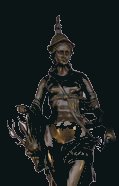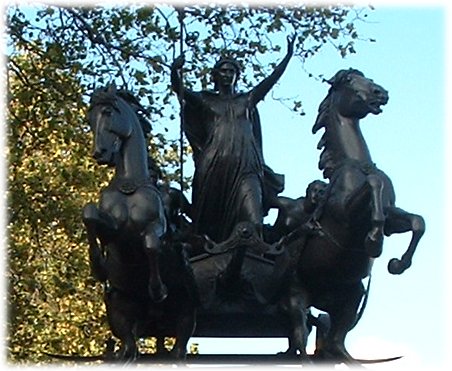Queen Boudica
Boudica, the widow of Prasutagus, had become queen of the Iceni after she and her two daughters were subjected to grave humiliations by the Romans. She led a revolt of the Iceni and several other tribes which lasted for several months in AD 60 or 61.

The Boudican forces burned and destroyed the three major towns of Londinium (London), Verulamium (St. Albans), and Camulodunum (Colchester), killing many thousands of citizens.
The revolt was eventually suppressed in AD 61 by the Roman military governor Suetonius Paulinus. The story is told in 'Annals' by Tacitus, written about AD 110-120. Tacitus had a special interest in Britain because of his father-in-law, Agricola, became governor of the Province in AD 77-85 after a successful military campaign in Wales and the north. This campaign, together with some details on the native Celtic tribes, is described in the book 'Agricola' by Tacitus, written in AD 98.
Prasutagus - the late king of the Icenians- in the course of a long reign had amassed considerable wealth. By his will he left the whole fortune to his two daughters and the emperor in equal shares, conceiving by that stroke of policy that he should provide at once for the tranquillity of his kingdom and his family. The event was otherwise. His dominions were ravaged by the centurions; the slaves pillaged his house and his effects were seized as lawful plunder. His wife Boudica was disgraced with cruel stripes; her daughters were ravished, and the most illustrious of the Icenians, were by force deprived of the positions which had been transmitted to them by their ancestors.
The whole country was considered as a legacy bequeathed to the plunderers. The relations of the deceased king were reduced to slavery. Exasperated by their acts of violence, and dreading worse calamities, the Icenians had recourse to arms. The Trinobantians joined in the revolt. The neighbouring states, not as yet taught to crouch in bondage pledged themselves in secret councils, to stand forth in the cause of liberty. What chiefly fired their indignation was the conduct of the veterans, lately planted as a colony at Camulodunum. These men treated the Britons with cruelty and oppression; they drove the natives from their habitations and calling them by the (shameful) names of slaves and captives, added insult to their tyranny.
In these acts of oppression, the veterans were supported by the common soldiers; a set of men, by their habits of life, trained to licentiousness, and in their turn, expecting to reap the same advantages.
The temple built in honour of Claudius was another cause of discontent. In the eye of the Britons, it seemed the citadel of eternal slavery. The priests, appointed to officiate at the altar, with a pretended zeal for religion, devoured the whole substance of the country. To over-run a colony, which lay quite naked and exposed, without a single fortification to defend it, did not appear to the incensed and angry Britons an enterprise that threatened either danger or difficulty. The fact was, the Roman generals attended to improvements to taste and elegance, but neglected the useful. They embellished the province and took no care to defend it.

Boudica, (in a chariot), with her two daughters before her, drove through the ranks. She harangued the different nations in their turn: "This," she said, "is not the first time that the Britons have been led to battle by a woman." But now she did not come to boast the pride of a long line of ancestry, nor even to recover her kingdom and the plundered wealth of her family. She took the field, like the meanest among them, to assert the cause of public liberty, and to seek revenge for her body seamed with ignominious stripes, and her two daughters infamously ravished.
From the pride and arrogance of the Romans, nothing is sacred; all are subject to the violation; the old endure the scourge, and the virgins are deflowered. But the vindictive gods are now at hand. A Roman legion dared to face the warlike Britons: with their lives, they paid for their rashness; those who survived the carnage of that day, lie poorly hid behind their entrenchments, meditating nothing but how to save themselves by an ignominious flight. From the din of preparation, and the shouts of the British army, the Romans, even now, shrink back with terror.
"What will be their case when the assault begins? Look round, and view your numbers. Behold the proud display of warlike spirits, and consider the motives for which we draw the avenging sword. On this spot, we must either conquer or die with glory. There is no alternative. Though a woman, my resolution is fixed: the men, if they please, may survive with infamy, and live in bondage." The engagement began. The Roman legion presented a close embodied line. The narrow defile gave them the shelter of a rampart. The Britons advanced with ferocity and discharged their darts at random. In that instant, the Romans rushed forward in the form of a wedge. The auxiliaries followed with equal ardour. The cavalry, at the same time, bore down upon the enemy, and, with their picks, overpowered all who dared to make a stand. The Britons betook themselves to flight, but their waggons in the rear obstructed their passage. A dreadful slaughter followed. Neither sex nor age was spared. The cattle, falling in one promiscuous carnage, added to the heaps of slain. The glory of the day was equal to the most splendid victory of ancient times. According to some writers, not less than eighty thousand Britons were put to the sword. The Romans lost about four hundred men, and the wounded did not exceed that number. Boudica, by a dose of poison, ended her life. Poenius Postumius, the Prefect in the camp of the second legion, as soon as he heard of the brave exploits of the fourteenth and twentieth legions, felt the disgrace of having - in disobedience to the orders of his general - robbed the soldiers under his command of their share in so complete a victory.
Stung with remorse, he fell upon his sword and expired on the spot.
Legend has it that Boudica was buried beneath platform 9 at Kings Cross Station.
London Time

Follow Us
The contents of this website are the property of knowledgeoflondon.com and therefore must not be reproduced without permission. Every effort is made to ensure the details contained on this website are correct, however, we cannot accept responsibility for errors and omissions.
© Copyright 2004 -
Contact Us | Advertise